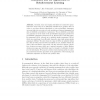Free Online Productivity Tools
i2Speak
i2Symbol
i2OCR
iTex2Img
iWeb2Print
iWeb2Shot
i2Type
iPdf2Split
iPdf2Merge
i2Bopomofo
i2Arabic
i2Style
i2Image
i2PDF
iLatex2Rtf
Sci2ools
ALT
2006
Springer
2006
Springer
Probabilistic Generalization of Simple Grammars and Its Application to Reinforcement Learning
Abstract. Recently, some non-regular subclasses of context-free grammars have been found to be efficiently learnable from positive data. In order to use these efficient algorithms to infer probabilistic languages, one must take into account not only equivalences between languages but also probabilistic generalities of grammars. The probabilistic generality of a grammar G is the class of the probabilistic languages generated by probabilistic grammars constructed on G. We introduce a subclass of simple grammars (SGs), referred as to unifiable simple grammars (USGs), which is a superclass of an efficiently learnable class, right-unique simple grammars (RSGs). We show that the class of RSGs is unifiable within the class of USGs, whereas SGs and RSGs are not unifiable within the class of SGs and RSGs, respectively. We also introduce simple contextfree decision processes, which are a natural extension of finite Markov decision processes and intuitively may be thought of a Markov decision...
ALT 2006 | Machine Learning | Probabilistic Grammars | Right-unique Simple Grammars | Simple Grammars |
| Added | 14 Mar 2010 |
| Updated | 14 Mar 2010 |
| Type | Conference |
| Year | 2006 |
| Where | ALT |
| Authors | Takeshi Shibata, Ryo Yoshinaka, Takashi Chikayama |
Comments (0)

